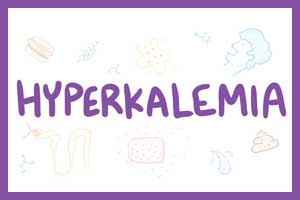- Home
- Editorial
- News
- Practice Guidelines
- Anesthesiology Guidelines
- Cancer Guidelines
- Cardiac Sciences Guidelines
- Critical Care Guidelines
- Dentistry Guidelines
- Dermatology Guidelines
- Diabetes and Endo Guidelines
- Diagnostics Guidelines
- ENT Guidelines
- Featured Practice Guidelines
- Gastroenterology Guidelines
- Geriatrics Guidelines
- Medicine Guidelines
- Nephrology Guidelines
- Neurosciences Guidelines
- Obs and Gynae Guidelines
- Ophthalmology Guidelines
- Orthopaedics Guidelines
- Paediatrics Guidelines
- Psychiatry Guidelines
- Pulmonology Guidelines
- Radiology Guidelines
- Surgery Guidelines
- Urology Guidelines
Early correction of hyperkalemia in ED cuts mortality by half: Study

STONY BROOK, NY -Hyperkalemia is defined as a potassium level greater than 5.5 mEq/L. It is common and can be difficult to diagnose clinically because symptoms may be vague or absent. However, the fact that hyperkalemia is associated with mortality can lead to sudden death from cardiac arrhythmias requires that physicians be quick to consider hyperkalemia in patients who are at risk for it.
Millions of patients suffering from diabetes, heart failure, hypertension, and renal failure are at an increased risk for hyperkalemia. Many therapies to treat these conditions may also increase potassium levels. Therefore new protocols for management have to be devised to cut down mortality due to Hyperkalemia in emergency settings.
The researchers conducted a study to determine if the rapid correction of elevated serum potassium level (K +) was associated with reduced mortality in emergency department (ED) patients.
In a new study published in the American Journal of Emergency Medicine, Adam Singer, MD, et al reported that quickly correcting high potassium levels, a condition known as hyperkalemia, in emergency department patients cut mortality in that population by half.
In the study, Singer, professor and vice-chair of research for the Department of Emergency Medicine in the Renaissance School of Medicine at Stony Brook University, and colleagues, reviewed nearly 115,000 Stony Brook University Hospital ED visits during 2016 and 2017, finding the mortality rate was significantly reduced in this patient cohort (6.3 % vs. 12.7 %).
"Because of the increased risk of hyperkalemia in this population, it is important, as our study showed, to develop protocols that help quickly identify and correct hyperkalemia while the patient is still in the emergency department," said Dr Singer.
The researchers concluded that Normalization of K + during the ED stay in patients with hyperkalemia is associated with a 50% mortality reduction. Efforts to rapidly identify and treat hyperkalemia in the ED are needed.
for more details click on the link: http://dx.

Disclaimer: This site is primarily intended for healthcare professionals. Any content/information on this website does not replace the advice of medical and/or health professionals and should not be construed as medical/diagnostic advice/endorsement or prescription. Use of this site is subject to our terms of use, privacy policy, advertisement policy. © 2020 Minerva Medical Treatment Pvt Ltd